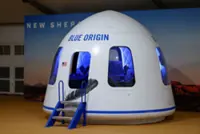FILE PHOTO: A Waymo rider-only robotaxi is seen during a test ride in San Francisco, California, U.S., December 9, 2022. REUTERS/Paresh Dave
WASHINGTON (Reuters) - A major transport union on Tuesday opposed a request filed by Alphabet's self-driving unit Waymo and autonomous driving technology company Aurora for an exemption from rules on warning devices for large semi-trucks, citing safety issues.
The Federal Motor Carrier Safety Administration (FMCSA) said last month it received a joint application from Waymo and Aurora seeking a five-year exemption from rules that require drivers to place reflective triangles or a flare around a stopped truck to alert other drivers and help prevent a crash.
Already a subscriber? Log in
Save 30% OFF The Star Digital Access
Cancel anytime. Ad-free. Unlimited access with perks.





